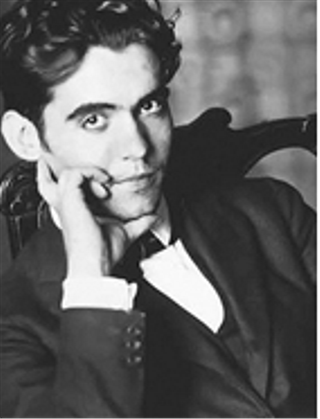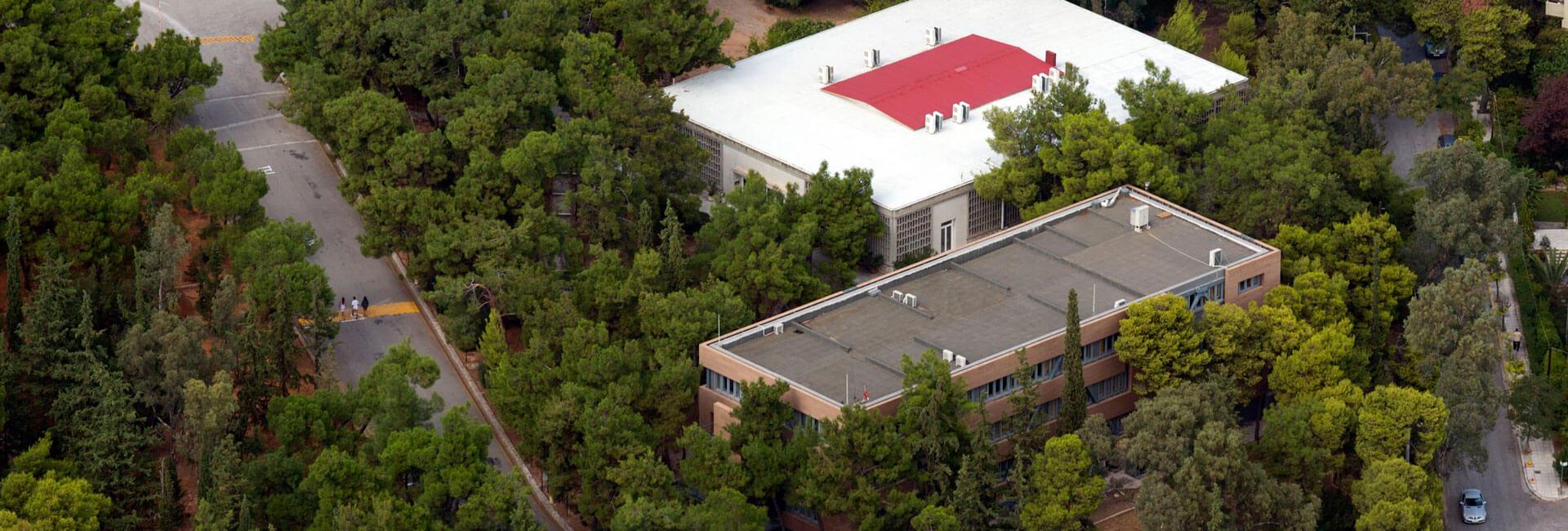
Federico Garcia Lorca (1898 – 1936)
80 years since the death of the Spanish poet and playwright
FedericoGarcía Lorca is recognized as one of the preeminent Spanish poets andplaywrights of the last century.
Biography
“Federico García Lorca was bornon June 5, 1898 in Fuente Vaqueros, a village just outside Granada, where hespent his childhood years. His fatherwas a prosperous landowner and his mother a teacher. In the first months of his life he suffered aserious illness which left him with a slight limp.
García Lorca attended theUniversity of Granada where he read Philosophy and Law, while also takingguitar and piano lessons with Manuel de Falla. In 1918 he moved to Madrid and lived in a dorm where he met and becamefriends with Luis Buñuel, Salvador Dalí, Miguel Unamuno and others. In 1920 hisfirst full-length play, The Butterfly’sEvil Spell (El maleficio de la mariposa), premiered in Madrid. That same year he enrolled in the School of Philosophyand the following year his first collection of poetry entitled Book of Poems (Libro de poemas) wasreleased, while at the time preoccupied with writing Poem of the Deep Song (Poema del Cante Jondo). In 1922 he gave a lecture on “cantejondo” (an unspoiled form of Andalusian folk music) and soon thereafterorganized a Cante Jondo Festivaltogether with de Falla. Again incollaboration with de Falla, he organized performances of the Andalusian Puppet Show Cachiporra. In1925 García Lorca’s play Mariana Pinedapremiered, with distinguished actress Margarita Xirgu as the female lead andstage sets constructed by Salvador Dalí.
In 1928, together with friendsfrom Granada, García Lorca edited the literary magazine El Gallo (The Rooster) where his short plays The maiden, the sailor and the student (Ladoncella, el marinero y el estudiante) and Buster Keaton goes fora stroll (El paseo de Buster Keaton) werefirst published. That same year, the first part of Gypsy Ballads (Romancero Gitano), a collection of poems from theperiod 1924-1927, was released.
Following a trip to New York andCuba, García Lorca returned to Madrid in 1930 where his play The Shoemaker’s Prodigious Wife (La zapateraprodigiosa) was performed in the national theater Teatro Español. After theSpanish Republic was proclaimed, García Lorca’s Poem of the Deep Song was published.
In 1932, together with EduardoUgarte, he founded and was appointed director of a student theater company, The Shack (Teatro Universitario La Barraca),which toured Spain’s rural areas in order to introduce audiences to classicSpanish theater free of charge. During the period 1932-1934, García Lorcaoccupied himself with the writing of what has been referred to as the “ruraltrilogy” – three plays concerned with life, love, and tragedy in ruralSpain. The first, BloodWedding (Boda de Sangre) was performed in 1933, followed by The Love of Don Perlimplín and Belisa in the Garden (Amor de don Perlimplíncon Belisa en su jardín). The following year Yerma, once again starring Margarita Xirgu inthe lead role, was performed in the national theater Teatro Español.
At thesame time, La Barraca (the studenttheater company), gave performances in South America, whilst García Lorca wrotethe poem Lament for IgnacioSánchez Mejías (Llanto porIgnacio Sánchez Mejías). Thefollowing year, his plays ThePuppet Play of Don Cristóbal (Retablillo de DonCristóbal) and Doña Rosita the Spinster (Doña Rosita lasoltera) were first performed.
In 1936, during a ceremony in honor of thepoet Rafael Alberti, García Lorca publicallyread the Spanish writers’ proclamation against fascism and on July 16thhe departed for Granada. The followingday, the Spanish Civil War broke out with a military uprising, followed soonthereafter by the especially brutal fascist regime of Franco. Three days later, on July 20th, the fascists overtookGranada and on August 3rd, García Lorca’s brother-in-law,Montesinos, the Socialist Mayor of Granada, was captured and executed. García Lorca fled and took refuge at the homeof a friend, the poet Luis Rosales, whose brothers were fascists. He was arrested in the early morning hours ofAugust 18th and detained in the Government House of Granada. At dawn on August 19th, GarcíaLorca was executed in the village of Viznar.”
- from Biblionet

Read more in Greek ...
Έργα του συγγραφέα διαθέσιμα στη βιβλιοθήκη
Garcia Lorca, Federico. Θέατρο και ποίηση. Αθήνα: Ίκαρος, 1990. (868.6209 GAR)
Garcia Lorca, Federico. Ματωμένος γάμος. Αθήναι: Ίκαρος, 1964. (862.6 GAR)
Garcia Lorca, Federico. Ντουέντε: ρόλος και θεωρία. Αθήνα: Τυπ. Επτάλοφος, 1970. (865.62 GAR)
Garcia Lorca, Federico. Μοιρολόι για τον Ιγνάθιο Σάντσεθ Μεχίας. Αθήνα: [χ.ε.], 1969. (862.6 GAR)
Garcia Lorca, Federico. Five plays: comedies and tragicomedies. Norfolk, Conn.: New Directions, 1963. (862.62 GAR)
Garcia Lorca, Federico. Τα μάγια της πεταλούδας: κωμωδία σε δύο πράξεις κι έναν πρόλογο (1919) Οι φασουλήδες του Κατσίπορρα: κωμικοτραγωδία του Δον Κριστομπάλ και της κυρά Ροζίτας: φάρσα σε έξη εικόνες και μια ανακοίνωση. Αθήνα: Εκδόσεις Δωδώνη, [196-]. (862.6 GAR)
Garcia Lorca, Federico. Ματωμένος γάμος. Αθήναι: Άτλας, (193-). (862.6 GAR)
Garcia Lorca, Federico. Άπαντα. Αθήνα: Γ. Μέρμηγκας, [197;]. (868.6209 GAR τ. 1-8)
Garcia Lorca, Federico. Ο Φεντερίκο Γκαρθία Λόρκα τραγουδάει ελληνικά: επιλογή από ολόκληρο το ποιητικό του έργο με αντιπαράθεση του ισπανικού κειμένου. Αθήνά: Νιάρχος, [198-;]. (861 GAR)
Garcia Lorca, Federico. Αφιέρωμα στον Φεδερίκο Γκαρθία Λόρκα: μουσική βραδυά. Αθήνα: Εθνική Πινακοθήκη, 1987. (861.62 GAR)
Garcia Lorca, Federico. Ντουέντε: ρόλος και θεωρία. Αθήνα: Εστία, 1998. (865.62 GAR)
Garcia Lorca, Federico. Selected poems. Newcastle upon Tyne: Bloodaxe, 1992. (862.62 GAR)
Garcia Lorca, Federico. Σχέδια. Αθήνα: [Εμπορική Τράπεζα της Ελλάδος], 1987. (ART 759.6 GAR)
Garcia Lorca, Federico. Το κοινό: δράμα σε έξι σκηνές – Κωμωδία χωρίς τίτλο: μονόπρακτο. Αθήνα: Άγρα, 1981. (862 GAR)
Garcia Lorca, Federico. Σονέτα του σκοτεινού έρωτα. Αθήνα: Μικρή Άρκτος, 2004. (861.62 GAR & CD 861.62 GAR)
Garcia Lorca, Federico. Lorca: Θέατρο. Αθήνα: Σαμουράϊ, [1971]. (862.62 GAR)
Garcia Lorca, Federico. Selected verse. New York, N.Y.: Farrar, Straus and Giroux, 2004. (861.62 GAR)
Garcia Lorca, Federico. Γέρμα. Αθήνα: Κέδρος, 2008. (861.62 GAR)
Ενδιαφέρουσες ιστοσελίδες
http://www.poetryfoundation.org/poems-and-poets/poets/detail/federico-garcia-lorca#poet (Παρουσίαση του ποιητή στο Poetry Foundation)
https://www.theguardian.com/culture/2011/jun/25/spain-franco-federico-garcia-lorca (Άρθρα της εφημερίδας Guardian για την δολοφονία και τον τάφο του Lorca)
https://www.goodreads.com/author/quotes/44150.Federico_Garc_a_Lorca (Αποφθέγματα του Lorca)
http://www.classicspanishbooks.com/20th-cent-garcia-lorca.html (Παρουσίαση του ποιητή στο Spanish Books)
http://www.mixanitouxronou.gr/f-g-lorka-ton-ektelesan-choris-diki-giati-itan-omofilofilos-korifeos-piitis-ke-katadikase-to-fasismo-to-megalitero-thima-tis-ispanias-ston-emfilio/ (Ο Lorca στην Μηχανή του Χρόνου)
http://www.arive.gr/pages/tributes/federico_garcia_lorca/federico_garcia_lorca.html (Παρουσίαση του ποιητή με ενσωματωμένα ενδιαφέροντα βίντεο)
http://historyreport.gr/index.php/Πρόσωπα/2142-Λόρκα2c-Φρεντερίκο-Γκάρθια-ο-στρατευμένος-λογοτέχνης?tmpl=component&print=1&page= (Παρουσίαση και συνέντευξη του Lorca σε ανώνυμο δημοσιογράφο) 
